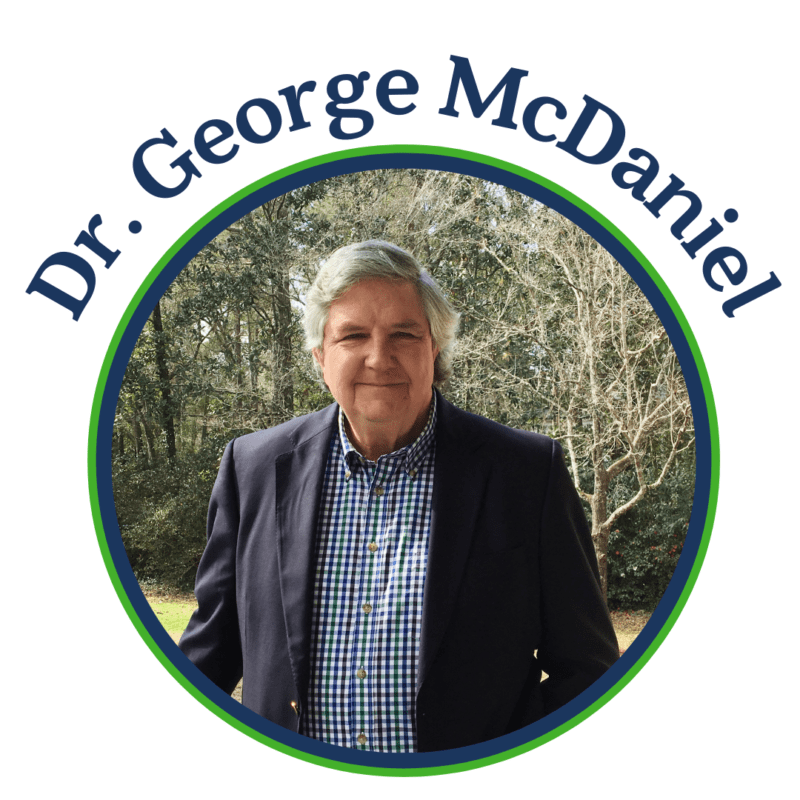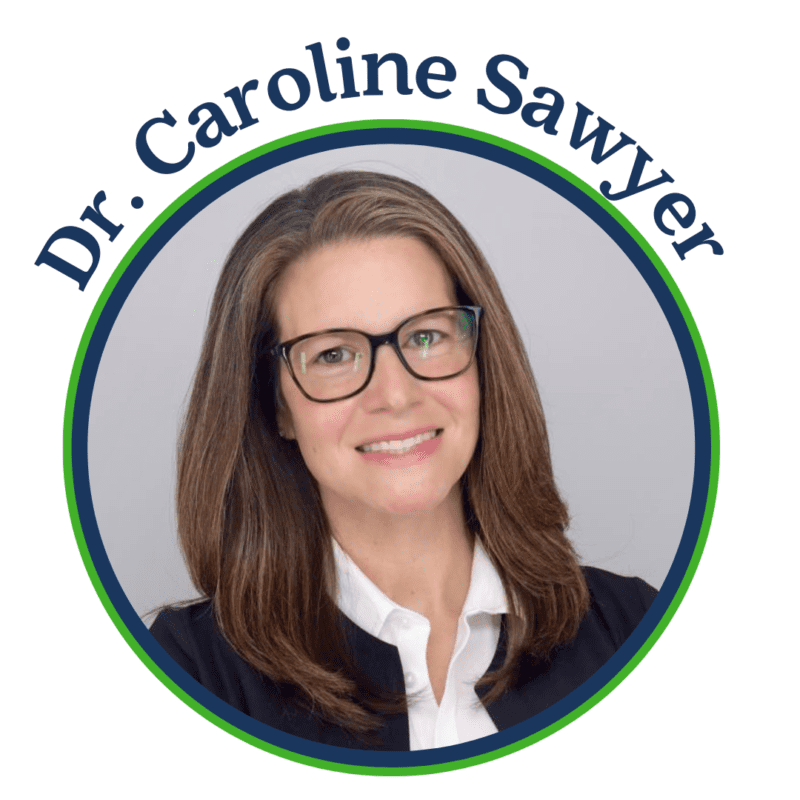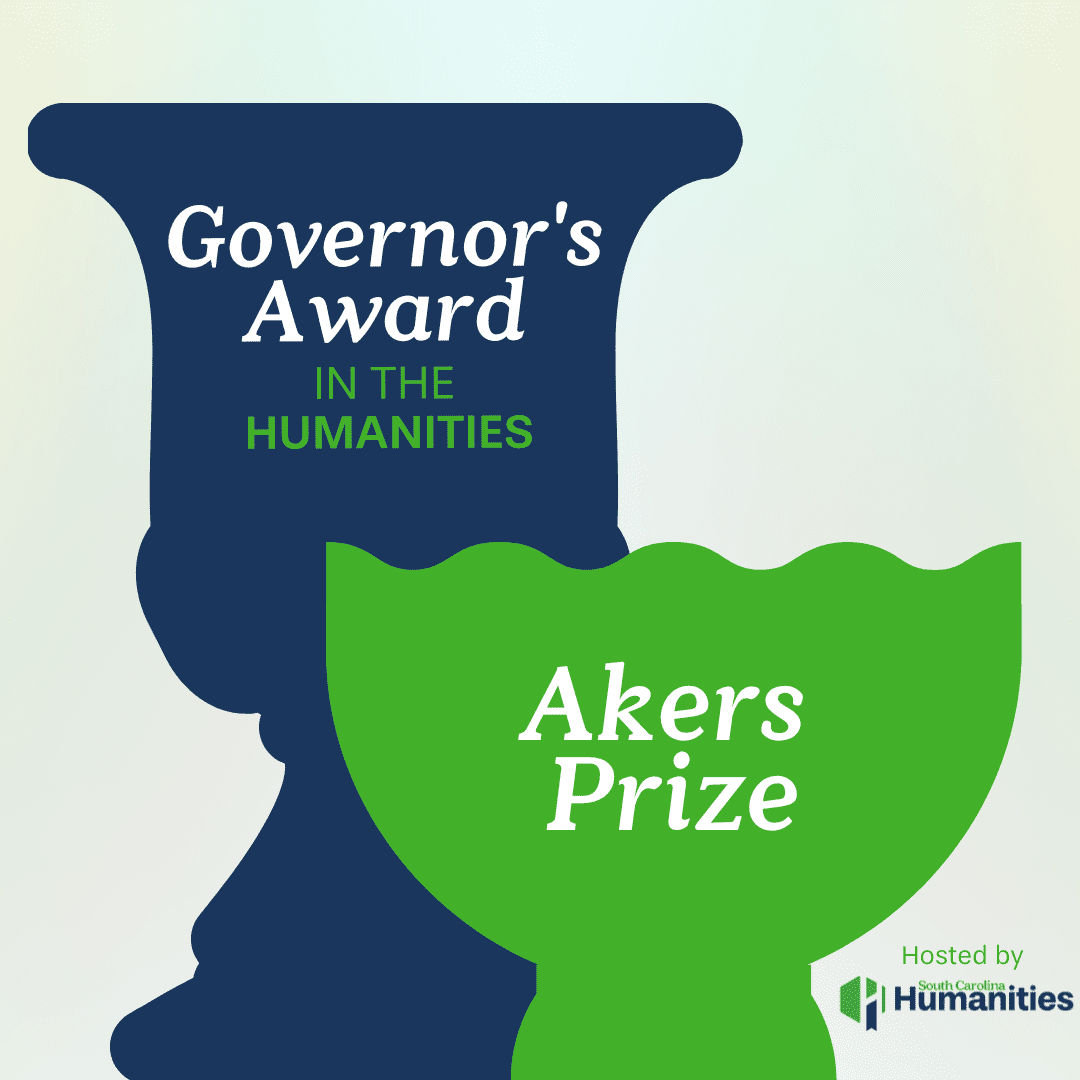South Carolina Humanities is pleased to announce the 2024 recipients of the Governor’s Awards in the Humanities and the Akers Prize.
Established in 1991, the Governor’s Awards recognize outstanding achievement in humanities research, teaching, and scholarship; institutional and individual participation in helping communities in South Carolina better understand our cultural heritage or ideas and issues related to the humanities; excellence in defining South Carolina’s cultural life to the nation or world; and exemplary support for public humanities programs. The 2024 recipients of the Governor’s Awards in the Humanities are: Dr. Julia Eichelberger, Marybelle Higgins Howe Professor of Southern Literature at the College of Charleston; Dr. George W. McDaniel, historian, Executive Director Emeritus of Drayton Hall, and President of McDaniel Consulting LLC; Thomas McNally, former Dean of Libraries at the University of South Carolina; and Victoria Smalls, celebrated scholar of Gullah Geechee culture and black history in South Carolina and Principal Consultant of Smalls Cultural Resources.
The Akers Prize, formerly the Fresh Voices in the Humanities Award, recognizes innovative individuals who use culture and history to bring people together, but whose efforts may have gone relatively unnoticed beyond their own community. The 2024 recipients of the Akers Prize are Dr. Caroline Sawyer, award-winning producer and an associate professor of Communications at USC Beaufort; and George Wingard, Program Coordinator for the Savannah River Archaeological Research Program and award-winning filmmaker.
 Dr. Julia Eichelberger has taught at the College of Charleston since 1992, after earning her BA from Davidson College and her MA and PhD from the University of North Carolina at Chapel Hill. Currently Marybelle Higgins Howe Professor of Southern Literature, she has taught a variety of courses, including African American literature, Southern literature and culture, Charleston writers, as well as courses in writing and literary interpretation. Her scholarship on Mississippi writer Eudora Welty includes two books of Welty’s previously unpublished letters Tell About Night Flowers: Eudora Welty’s Gardening Letters, 1940-1949 (2013), and To Absent Friends: Eudora Welty’s Correspondence with Frank Lyell (forthcoming), both from the University Press of Mississippi. At the College of Charleston, she researched and promoted more equitable employment practices for adjunct faculty, for which she was named a Faculty Champion in 2019 by the South Carolina chapter of the American Association of University Professors (AAUP). She directs the College’s minor in Southern Studies, which she helped co-found in 2016. She helped to establish the Center for the Study of Slavery in Charleston at the College in 2018, and co-chaired the Historical Review Taskforce that President Andrew Hsu convened in the summer of 2020. In Charleston, she has been a member of the interfaith Charleston Area Justice Ministry, representing their work in op-eds and public negotiations for restorative practices in Charleston County schools, decreased racial bias in policing, and mobile clinics that bring primary healthcare to more residents. Her experiences within and beyond the College of Charleston have fueled her scholarship and public history on Charleston writers, activists, and ordinary citizens who lived and worked on sites that are now part of the campus. Since 2021 she has served as the co-chair of the College’s Committee on Commemoration and Landscapes, which presents more honest and complete stories of the College and the surrounding neighborhood through historical signage, in-person tours, and the College’s website Discovering Our Past.
Dr. Julia Eichelberger has taught at the College of Charleston since 1992, after earning her BA from Davidson College and her MA and PhD from the University of North Carolina at Chapel Hill. Currently Marybelle Higgins Howe Professor of Southern Literature, she has taught a variety of courses, including African American literature, Southern literature and culture, Charleston writers, as well as courses in writing and literary interpretation. Her scholarship on Mississippi writer Eudora Welty includes two books of Welty’s previously unpublished letters Tell About Night Flowers: Eudora Welty’s Gardening Letters, 1940-1949 (2013), and To Absent Friends: Eudora Welty’s Correspondence with Frank Lyell (forthcoming), both from the University Press of Mississippi. At the College of Charleston, she researched and promoted more equitable employment practices for adjunct faculty, for which she was named a Faculty Champion in 2019 by the South Carolina chapter of the American Association of University Professors (AAUP). She directs the College’s minor in Southern Studies, which she helped co-found in 2016. She helped to establish the Center for the Study of Slavery in Charleston at the College in 2018, and co-chaired the Historical Review Taskforce that President Andrew Hsu convened in the summer of 2020. In Charleston, she has been a member of the interfaith Charleston Area Justice Ministry, representing their work in op-eds and public negotiations for restorative practices in Charleston County schools, decreased racial bias in policing, and mobile clinics that bring primary healthcare to more residents. Her experiences within and beyond the College of Charleston have fueled her scholarship and public history on Charleston writers, activists, and ordinary citizens who lived and worked on sites that are now part of the campus. Since 2021 she has served as the co-chair of the College’s Committee on Commemoration and Landscapes, which presents more honest and complete stories of the College and the surrounding neighborhood through historical signage, in-person tours, and the College’s website Discovering Our Past.

Historian George W. McDaniel, Ph.D., is the Executive Director Emeritus of Drayton Hall, a historic site in Charleston, SC, and president of McDaniel Consulting, LLC, a strategy firm that helps organizations use history to build bridges within itself and to its broader constituents. He graduated from Sewanee and returned to the Lovett School to teach history and French, the same high school from which he had graduated. He served in the Peace Corps in Togo, West Africa, and was drafted out of the Peace Corps into the infantry in Vietnam, an experience that shaped his subsequent career in the humanities. Upon return from combat, he earned a M.A.T. in history from Brown University and a Ph.D. in American History from Duke University. Becoming Executive Director of Drayton Hall in 1989, he retired in 2015 after winning awards for historic preservation, education, and environmental conservation at local, state, and national levels. The first of its kind in the nation, his critically acclaimed book Drayton Hall Stories: A Place and Its People has garnered prestigious awards. A frequent writer, speaker, and facilitator, he can be reached at gmcdaniel4444@gmail.com.
 Tom McNally spent 45 years as a librarian after graduating from the University of Washington in Seattle. He worked as an academic librarian at Ohio State University, the University of Michigan, and Loyola University of Chicago before arriving at the University of South Carolina. Tom worked at USC for 32 years, the last fifteen years as Dean of Libraries, during which time he led the renovation of the South Caroliniana Library and facilitated the acquisitions of the Augusta Baker Collection, the Grissom Collection of Ernest Hemingway, the Dashiel Hammett Family Papers, the Greiner Collection of James Dickey, the Elmore Leonard Archive, the Roy Collection of Burnsiana and Scottish Literature, the Wickenheiser Collection of John Milton and papers of John Jakes, Pat Conroy, James Elroy, and Robert Ariail.
Tom McNally spent 45 years as a librarian after graduating from the University of Washington in Seattle. He worked as an academic librarian at Ohio State University, the University of Michigan, and Loyola University of Chicago before arriving at the University of South Carolina. Tom worked at USC for 32 years, the last fifteen years as Dean of Libraries, during which time he led the renovation of the South Caroliniana Library and facilitated the acquisitions of the Augusta Baker Collection, the Grissom Collection of Ernest Hemingway, the Dashiel Hammett Family Papers, the Greiner Collection of James Dickey, the Elmore Leonard Archive, the Roy Collection of Burnsiana and Scottish Literature, the Wickenheiser Collection of John Milton and papers of John Jakes, Pat Conroy, James Elroy, and Robert Ariail.
 Victoria A. Smalls, a native of St. Helena Island, SC, is the Principal Consultant of Smalls Cultural Resources, where she champions Gullah Geechee communities across the United States and their global connections to Africa’s Diaspora, focusing on cultural and historical preservation, as well as climate, land, and ocean justice. She has held significant positions such as state Commissioner on the SC African American Heritage Commission, federal Commissioner on the Gullah Geechee Cultural Heritage Corridor Commission, and Executive Director of the Gullah Geechee Corridor National Heritage Area. In these roles, she collaborated with local, national, and international partners, and various governmental bodies to protect, preserve, and interpret the history, cultural practices, heritage sites, and natural resources of the Gullah Geechee people across the 12,000 square-mile National Heritage Area spanning North Carolina, South Carolina, Georgia, and Florida. She also worked with Congressional champions to reauthorize the National Heritage Area through 2037. Her leadership extends to the Penn Center National Historic Landmark District, where she served as Director of the York W. Bailey Museum, History, Art and Culture Program, and Assistant to the Executive Director. Additionally, she was Program Manager at the International African American Museum and a National Park Service Ranger with the Reconstruction Era National Historical Park. An alumna of SC Carolina State University, Technical College of the Lowcountry, and the University of South Carolina—Beaufort, Victoria’s passion for community advocacy and service has earned her numerous accolades, including the Black History USA Community Advocate Award, recognition as one of the 12 Black Leaders to Know in South Carolina, and selection as a Maven for The Art of Community: Rural SC. She has also been named a Leo Twiggs Arts Diversity Leadership Scholar, a Riley Fellow in Diversity Leadership with The Riley Institute at Furman University, and one of the 50 Most Influential Leaders in Charleston, SC. In 2022, Victoria received The President’s Lifetime Achievement Award and Medal for her dedicated volunteer service.
Victoria A. Smalls, a native of St. Helena Island, SC, is the Principal Consultant of Smalls Cultural Resources, where she champions Gullah Geechee communities across the United States and their global connections to Africa’s Diaspora, focusing on cultural and historical preservation, as well as climate, land, and ocean justice. She has held significant positions such as state Commissioner on the SC African American Heritage Commission, federal Commissioner on the Gullah Geechee Cultural Heritage Corridor Commission, and Executive Director of the Gullah Geechee Corridor National Heritage Area. In these roles, she collaborated with local, national, and international partners, and various governmental bodies to protect, preserve, and interpret the history, cultural practices, heritage sites, and natural resources of the Gullah Geechee people across the 12,000 square-mile National Heritage Area spanning North Carolina, South Carolina, Georgia, and Florida. She also worked with Congressional champions to reauthorize the National Heritage Area through 2037. Her leadership extends to the Penn Center National Historic Landmark District, where she served as Director of the York W. Bailey Museum, History, Art and Culture Program, and Assistant to the Executive Director. Additionally, she was Program Manager at the International African American Museum and a National Park Service Ranger with the Reconstruction Era National Historical Park. An alumna of SC Carolina State University, Technical College of the Lowcountry, and the University of South Carolina—Beaufort, Victoria’s passion for community advocacy and service has earned her numerous accolades, including the Black History USA Community Advocate Award, recognition as one of the 12 Black Leaders to Know in South Carolina, and selection as a Maven for The Art of Community: Rural SC. She has also been named a Leo Twiggs Arts Diversity Leadership Scholar, a Riley Fellow in Diversity Leadership with The Riley Institute at Furman University, and one of the 50 Most Influential Leaders in Charleston, SC. In 2022, Victoria received The President’s Lifetime Achievement Award and Medal for her dedicated volunteer service.
 Dr. Caroline E. Sawyer is an award-winning producer, an associate professor of Communication Studies, and the director of the Sand Shark Center for Innovative Media. She earned her PhD in communication from the University of Memphis, her Master of Arts from Austin Peay State University, and her Bachelor of Business Administration from Baylor University. Her teaching experience includes working at several universities in Tennessee and California. In addition to her educational background, she worked professionally as a corporate communication consultant for several public and private corporations advising on media production, website design, social media campaigns, and public & investor relations. In and out of the classroom, Dr. Sawyer embraces experiential learning, or learning by doing (Kolb 1984). She is a hand-on person and a hands-on instructor. Her courses consist of learning theory and applying that theory into practical projects that help students build skills and their resume. One such opportunity is a show that she produces titled, By The River. By The River, an Emmy nominated show, is a collaborative TV show between USCB & SCETV that is nationally distributed to public media television via American Public Television. The show has received 11 national awards, 3 international awards, and one Southeast Emmy nomination. As the director of the Sand Shark Center for Innovative Media, Dr. Sawyer oversees the Innovative Media Lab, student media productions, some of the university athletic livestream productions, and works on collaborative community media projects. Through the Sand Shark Center for Innovative Media, Dr. Sawyer has provided significant support to the Mather School Museum & Interpretive Center. This work has included producing a short documentary about the Mather School, successfully writing $24,320 in grants for the museum to help provide programming, including digital media workshops for the community, matching students with the museum for internships and special projects such as social media campaigns, setting up a podcasting station in the museum so that Matherites, those who attended the Mather School, could record their story, and working with Dr. Mac James to develop a virtual walking tour of the historical Mather School campus. The audio version of this tour is currently being use by the Reconstruction Era National Park on their app to feature the Mather School.
Dr. Caroline E. Sawyer is an award-winning producer, an associate professor of Communication Studies, and the director of the Sand Shark Center for Innovative Media. She earned her PhD in communication from the University of Memphis, her Master of Arts from Austin Peay State University, and her Bachelor of Business Administration from Baylor University. Her teaching experience includes working at several universities in Tennessee and California. In addition to her educational background, she worked professionally as a corporate communication consultant for several public and private corporations advising on media production, website design, social media campaigns, and public & investor relations. In and out of the classroom, Dr. Sawyer embraces experiential learning, or learning by doing (Kolb 1984). She is a hand-on person and a hands-on instructor. Her courses consist of learning theory and applying that theory into practical projects that help students build skills and their resume. One such opportunity is a show that she produces titled, By The River. By The River, an Emmy nominated show, is a collaborative TV show between USCB & SCETV that is nationally distributed to public media television via American Public Television. The show has received 11 national awards, 3 international awards, and one Southeast Emmy nomination. As the director of the Sand Shark Center for Innovative Media, Dr. Sawyer oversees the Innovative Media Lab, student media productions, some of the university athletic livestream productions, and works on collaborative community media projects. Through the Sand Shark Center for Innovative Media, Dr. Sawyer has provided significant support to the Mather School Museum & Interpretive Center. This work has included producing a short documentary about the Mather School, successfully writing $24,320 in grants for the museum to help provide programming, including digital media workshops for the community, matching students with the museum for internships and special projects such as social media campaigns, setting up a podcasting station in the museum so that Matherites, those who attended the Mather School, could record their story, and working with Dr. Mac James to develop a virtual walking tour of the historical Mather School campus. The audio version of this tour is currently being use by the Reconstruction Era National Park on their app to feature the Mather School.
 George L. Wingard serves as the Program Coordinator for the Savannah River Archaeological Research Program (SRARP) working on the Savannah River Site (SRS). He began employment in 1993 as an archaeological field technician where he also produced hundreds of maps and illustrations for books, journals, presentations, and papers. Later he took on the offices administrative duties and acting as a liaison between the United States Department of Energy (USDOE) and the University of South Carolina (USC). Over the years as part of the mission of public education for the USDOE, George has given well over five-hundred presentations on local history and archaeology, specializing on the textile community of Graniteville, SC and the history of the SRS. George has been an advocate for ensuring the stories of the residents displaced by the building of the SRS in 1950 is remembered. Since 1996, he has given hundreds of tours to former residents and their families, the general public, and SRS employees. It is important their sacrifices are not forgotten. In 2013, George co-produced a documentary on the potter Dave of Edgefield entitles, “Discovering Dave: Spirit Captured in Clay”. This film has been used by several colleges when discussing early American History. His second film “Mart to Art: A Repurposed Life” about a former SRS building moved to Barnwell and today continues as an art gallery has been present on South Carolina Education Television (SCETV) since 2018. Since then he has produced and directed eight more films with two in pre-production. These films focus on aspects of local history from areas around South Carolina including: Edgefield, Colleton, Aiken, Barnwell, Beaufort, and Allendale counties. During the pandemic shutdown, the need to continue public education was paramount, and he produced an on-line short series called “More the Life of an Artifact” based on one of the short films entitled “Life of an Artifact”. This series contextualized a specific artifact in the SRARP’s vast collection and are uploaded for streaming. George has won over eighty film society accolades including: Best South Carolina Historical Filmmaker, Best Faith-Based film, and Best South Carolina Director. He has also been awarded the 2017 Alexander S. Sally Professional Service Award by the Confederation of South Carolina Local Historical Societies. George and his wife Liz live in Warrenville, South Carolina and have a daughter Erin.
George L. Wingard serves as the Program Coordinator for the Savannah River Archaeological Research Program (SRARP) working on the Savannah River Site (SRS). He began employment in 1993 as an archaeological field technician where he also produced hundreds of maps and illustrations for books, journals, presentations, and papers. Later he took on the offices administrative duties and acting as a liaison between the United States Department of Energy (USDOE) and the University of South Carolina (USC). Over the years as part of the mission of public education for the USDOE, George has given well over five-hundred presentations on local history and archaeology, specializing on the textile community of Graniteville, SC and the history of the SRS. George has been an advocate for ensuring the stories of the residents displaced by the building of the SRS in 1950 is remembered. Since 1996, he has given hundreds of tours to former residents and their families, the general public, and SRS employees. It is important their sacrifices are not forgotten. In 2013, George co-produced a documentary on the potter Dave of Edgefield entitles, “Discovering Dave: Spirit Captured in Clay”. This film has been used by several colleges when discussing early American History. His second film “Mart to Art: A Repurposed Life” about a former SRS building moved to Barnwell and today continues as an art gallery has been present on South Carolina Education Television (SCETV) since 2018. Since then he has produced and directed eight more films with two in pre-production. These films focus on aspects of local history from areas around South Carolina including: Edgefield, Colleton, Aiken, Barnwell, Beaufort, and Allendale counties. During the pandemic shutdown, the need to continue public education was paramount, and he produced an on-line short series called “More the Life of an Artifact” based on one of the short films entitled “Life of an Artifact”. This series contextualized a specific artifact in the SRARP’s vast collection and are uploaded for streaming. George has won over eighty film society accolades including: Best South Carolina Historical Filmmaker, Best Faith-Based film, and Best South Carolina Director. He has also been awarded the 2017 Alexander S. Sally Professional Service Award by the Confederation of South Carolina Local Historical Societies. George and his wife Liz live in Warrenville, South Carolina and have a daughter Erin.
Learn more about this year’s winners and see a list of past recipients on the Humanities Awards page of SC Humanities’ website.
The 33nd Annual South Carolina Awards in the Humanities Luncheon and Ceremony will be held at the Pastides Alumni Center (900 Senate St, Columbia, SC 29201) on Wednesday, October 23, 2024 at 11:30 a.m. Table sponsorships are available, as well as individual tickets. Learn more about table sponsorship opportunities.
*Ticket sales and table sponsorship opportunities close on Tuesday, October 1, 2024.
The mission of SC Humanities is to enrich the cultural and intellectual lives of all South Carolinians. Established in 1973, this 501(c)3 organization is governed by a volunteer Board of Directors comprised of community leaders from throughout the state. It presents and supports literary initiatives, lectures, exhibits, festivals, publications, oral history projects, videos, and other humanities-based experiences that directly or indirectly reach more than 250,000 citizens annually. South Carolina Humanities receives funding from the National Endowment for the Humanities as well as corporate, foundation and individual donors. The National Endowment for the Humanities: Democracy demands wisdom.
